Seasonal Dog Training Tips: Preparing Your Pup for Winter Challenges
Understanding Winter Challenges for Dogs
As winter approaches, dog owners must prepare their canine companions for the colder months. Just as humans adapt their routines to cope with the chill, our furry friends also require some adjustments. From icy sidewalks to shorter days, winter presents a unique set of challenges for dogs.
The drop in temperature means your dog might need extra protection to stay warm, especially during walks. Furthermore, the season can affect your dog's behavior and health, making it essential to adjust their training and care routines.

Keeping Your Dog Active Indoors
Winter weather can limit outdoor time, but it's crucial to keep your dog active even when it's cold outside. Indoor games and exercises can help burn off energy and prevent boredom.
Consider playing fetch in a hallway or teaching your dog new tricks. Puzzle toys and treat dispensers can also provide mental stimulation, keeping your pup engaged and entertained.
Indoor Training Sessions
Winter is an excellent time to focus on indoor training sessions. Strengthening obedience commands like sit, stay, and come can be beneficial for safety during icy conditions outside.
Short, frequent sessions can reinforce good behavior and provide mental exercise. Remember to use positive reinforcement to encourage your dog and make learning enjoyable.

Protecting Your Dog from the Cold
When venturing outside, it's important to protect your dog from the cold. Depending on your dog's breed and size, they may need a coat or sweater to maintain body heat.
Paw protection is also crucial. Ice, salt, and snow can cause irritation or injury to your dog's paws. Consider using pet-safe paw balm or booties to shield their feet during walks.
Monitoring Your Dog's Health
Winter can exacerbate certain health conditions in dogs, such as arthritis. Keep an eye on any signs of discomfort or stiffness and consult your veterinarian if needed.
Additionally, ensure your dog stays hydrated. Indoor heating can dry out the air, so make sure your pup has access to fresh water at all times.

Adjusting Your Walk Routine
With shorter daylight hours, you might need to adjust your walking routine. Try to schedule walks during daylight when it's warmer and easier to see. If you walk your dog in the dark, consider using reflective gear for both you and your dog for added safety.
Be mindful of icy patches on sidewalks and roads. Train your dog to walk calmly beside you to prevent slipping or pulling on the leash.
Ensuring Socialization
Winter weather can limit socialization opportunities, but it's important for your dog to interact with other dogs and people. Arrange playdates with other dogs or visit indoor dog parks when possible.
If outdoor socialization is challenging, consider enrolling in a dog training class or group activity. This can help maintain social skills and provide a fun environment for learning.
